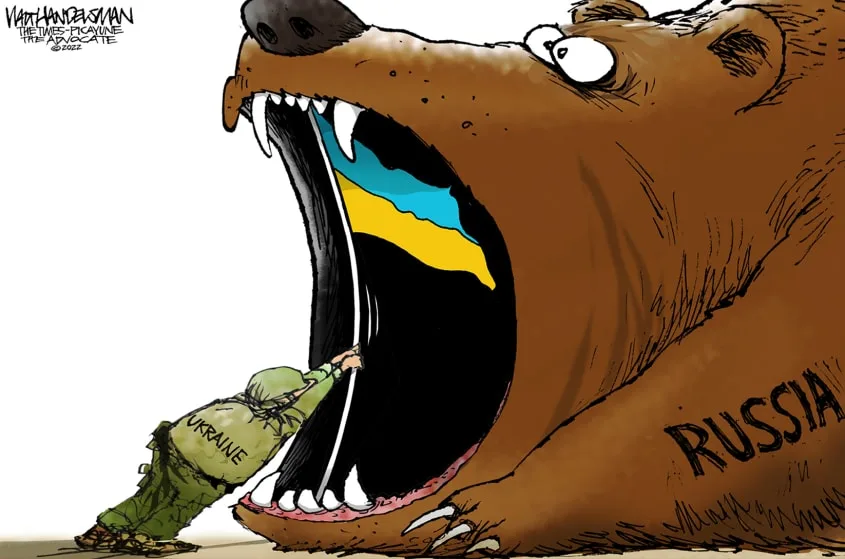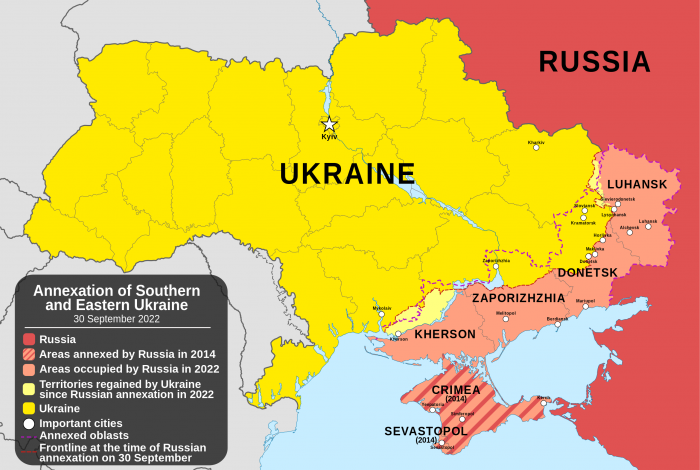Two Year Anniversary of Russia’s Invasion of Ukraine
Adel Bashqawi
February 24, 2024

February 24 marks the second anniversary of Russia’s expansionist invasion of neighboring Ukraine. It was not easy for Ukraine to bear the difficulty and cruelty of a devastating war, which the Russian state initiated on the twenty-fourth of February 2022. The whole country came under brutal assault. However, the choice of the terrified and displaced inhabitants who survived extermination was to engage in a defensive war that needed to be firm and steadfast. The Russian state did not take into account that there were international laws and norms, which must be adhered to. Luckily, other countries were interested in resisting any colonial expansion at the expense of neighboring countries.
Even worse than that, it modified and distorted documented historical facts. Russia in 2009, “issued a DVD and a thick book of historical documents … to dispute claims that the Ukrainian famine of the 1930s amounted to genocide. Russian archivists and historians pressed the Kremlin’s case that the Stalin-era famine — which killed millions of people — was a common tragedy across Soviet farmlands, countering efforts by Ukraine’s pro-Western president to convince the world that Ukrainians were targeted for starvation.” [1]
However, in the same context, Ukraine was affected by a “hybrid” Russian invasion in February 2014, following the end of the Winter Olympics Games held in Sochi in February 2014. That resulted in the annexation of the Crimean Peninsula to the Russian colonial state. Not to mention the mobilization of some supporters of Russia’s policies, in order to create armed conflicts. Russia implemented separatist policies by separating parts of the Donbas region in southeastern Ukraine in order to split from the Ukrainian state.
The illegal separatist regions were named the republics of the Crimea, Donetsk, and Luhansk, and it was declared that they had joined Russia. Also, with the start of the overt Russian colonial invasion in February 2022 with savagery and brutality, major Ukrainian cities were targeted, including the outskirts of the capital, Kiev, in an attempt to occupy the entire Ukrainian state. But after Russian forces were forced to retreat beyond the international border, Russian occupation remained in parts of Zaporizhzhia and Kherson provinces along the southeastern side of the Dnieper River.

If we assume that there is a conflict between the two sides of the well-known colonial equation, namely the Russian colonial side and the other targeted side, that is, the oppressed and occupied peoples and nations. In this case, Ukraine was invaded by a fascist foreign occupation power, as a result of a destructive, unjustified, and illegal war. The invasion and subjugation of parts of Ukraine was the result of barbaric invasion and unjust occupation. Knowing that the invaders recruited convicts, criminal prisoners, who are women-murderers, baby-killers and perpetrators of other crimes.
“Russia’s military has institutionalized the recruitment of convicts into its ranks as it seeks to shore up its numbers for the war in Ukraine. Building upon a system pioneered by the Wagner mercenary group, the previously informal practice allows convicts a chance at redemption in exchange for risking their lives on the front lines — and for the government to avoid the expansion of unpopular civilian mobilization. Today, prisoners are not just allowed but encouraged to serve as regular combatants, with the reward of a presidential pardon enticing many to enlist.” [2]
It has been proven beyond a doubt that the Russian colonialists side excels deservedly to manage the disputes for its own self-interested, selfish benefits and opportunistic interests. This is regardless of the disastrous results that affected his corrupt entity on the one hand, and its repercussions on the occupied territories on the other hand. The occupier ignores the irrefutable truth regarding the occupied territories and the legitimate rights of peoples, which cannot be ignored. Rather, the military occupation tramples them without caring about its treatment of the victims.
With many countries of the world standing by Ukraine, especially the European Union and the United States in international arenas and forums, Ukraine was able to repel Russian aggression and repel military forces in some places of penetration beyond international borders. Most of these countries also provided economic and military aid to thwart Russian plans. But the choice of the terrified residents and the citizens who survived and were displaced by the genocide was to fight a defensive war that required determination and steadfastness. Fortunately, many countries have opened their borders to refugees who were forced to leave their homeland as a result of the violent fighting seen as a result of battles and military campaigns.
All of a sudden, Alexei Navalny, a 47-year-old Russian opposition figure and critic of the Kremlin, was pronounced dead in his prison on February 16, 2024. This important development signals another danger facing those seeking political activism in Russia. Navalny was being held in a Siberian prison, serving a 19-year prison sentence. Thus, the Third Corrective Colony (IK-3), one of the harshest detention centers in Russia, is located 60 kilometers from the Arctic Circle, 2,000 kilometers northeast of the capital city of Moscow. It is one of the Russian concentration camps in Siberia, which was formerly a Soviet concentration camp. It was founded at the beginning of the Soviet era. The importance of this striking event lies in the fact that Navalny was one of the most prominent opponents of the current regime of Russian President Vladimir Putin.
While in prison, he criticized Russia’s war against Ukraine. Knowing that “Alexei Navalny was asked four years ago what he’d tell Russians if he were killed for challenging President Vladimir Putin.” He replied: “You’re not allowed to give up,” he told a documentary maker. “If they decide to kill me, it means we are incredibly strong and we need to use this power.” [3] On October 27, 2023, Alexey Navalny was described as an “imprisoned opposition leader who more than any other Russian political figure has challenged Vladimir Putin’s rule. He has condemned Russia’s invasion of Ukraine and said that Moscow must withdraw its troops and pay reparations. ” [4] His father is of Ukrainian origin, while his mother is of Russian origin.
In a remarkable development, on February 17, 2024, the aggressor Russian forces took control of the city of Avdiivka, located near the city of Donetsk in Donetsk District, in the regional center of the Donbas region in eastern Ukraine. This appears to have occurred as a result of the reduction in military and economic aid to Ukraine from friendly countries. The disagreement that occurred in the US Congress between the Republican and Democratic parties hampered the approval of this aid and the provision of a foreign aid package, including the one provided to Ukraine. U.S. Lawmakers did not agree to provide the necessary aid in a timely manner to confront the invading Russian forces. It is expected that the obstacles will be overcome in the coming short period. This new development came several months after the Russian forces and affiliated militias last took control of new areas. It seems that to capitalize on the victory of its military forces in Avdiivka, Russia aspires to advance to occupy other Ukrainian sites and locations.
Following the fall of Avdiivka, former Russian president, the current Deputy Chairman of Russia’s Security Council, Dmitry Medvedev quoted as saying, “in order to {achieve the goals of the special military operation (the Russian propaganda euphemism for the war against Ukraine)}, Russian forces will have to march on Kyiv again, {if not now, then at some point}, and that Russia has {long desired the city of Odesa}.” [5]
Finally, it is necessary to follow up on what has happened since the occupation of the Crimean Peninsula in 2014, and Russia’s role to assist the separatist movements in Donbas. There was no indecision or hesitation in making colonial decisions. The initial goal of the newly created separatist movements, located in southeastern Ukraine, was to occupy parts of Ukraine, namely Donetsk and Luhansk. Thus, after the Russian invasion of 2022, military occupation was extended over other parts of the Zaporozhye and Kherson provinces, which are located on the left bank of the Dnieper River. The Russian colonial ambitions were decisively determined and demonstrated, by the decisions of permanent annexation, where the well-known spirit of greed and control with the intention of acquisition prevailed.
*********************
References
[3] https://abcnews.go.com/International/wireStory/russian-opposition-lost-brightest-star-now-107335809
[4] https://www.washingtonpost.com/world/2023/10/27/navalny-ukraine-putin-russia/
